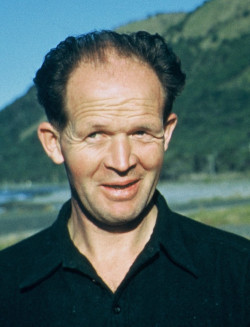Wellman Paleontology Prize
No award made in 2024
Past Wellman Paleontology Prize winners
In 2025 the Wellman Palaeontology Prize replaced the Harold Wellman Prize.
| Year | Person | From | Fossil find | |
| 2023 | Derek Batchelor | Dannevirk |
Discovery of a shark’s spiral valve. |
|
| 2022 | Thomas Stolberger and Nathan Collins | Auckland |
Discovery of numerous new Pliocene mollusc species from sediment excavated during the construction on Watercare’s Central Interceptor wastewater tunnel in Māngere, Auckland. |
|
| 2020 | Jonathan Dale | Canterbury | For a decade collecting specimens of penguin, whale, dolphin and fish bones from the Hakataramea Limestone Quarry which have been generously donated to the University of Otago collections. | |
| 2019 | Peter Shaw | Hawkes Bay | For his work on fossils in the Maungataniwha Native Forest, including the largest mosasaur tooth on record in New Zealand. | |
| 2018 | Helen Bint | Chatham Island | Chatham Island Palaeocene fossil sponges. | |
| 2017 | Ian Geary | Otago University | Rich Pliocene plant fossil beds Beachlands, Auckland. | |
| 2016 | Sue Maxwell | Otago Museum | Discovery of fossil material which was identified as the holotype of the extinct leatherback turtle Psephophorus terrypratchetti. | |
| 2014 | Leigh Love | Discovery of a new species of Paleocene bird (Australornis lovei) in the Waipara greensand deposits of North Canterbury. | ||
| Adrian & Thomas King | Discovery of a very well preserved flatfish fossil from the shallow marine-deposited Titiokura Fm, Te Pohue, western Hawke's Bay. | |||
| 2013 | Julian Thomson | Otago | Fossil partial lower jaw of a large baleen whale. | |
| 2012 | Barry Douglas & Jon Lindqvist | Otago University | 1978-79 discovery of the "St Bathans fauna" in the Manuherikia Group. | |
| 2011 | Leonard Bloksberg | Auckland | Late Cretaceous mosasaur coprolite. | |
| 2010 | Greg Browne | GNS | Late Cretaceous dinosaur footprints NW Nelson. | |
| 2009 | Uwe Kaulfus | Otago University | New fossil insects in New Zealand. | |
| 2008 | Dave Allen | New Plymouth | Marine bird skulls in Pliocene sediments near Hawera. | |
| 2007 | Robert Holmes | Chatham Island | A Mid Pleistocene marine fauna raised 200m above sea level on the Chatham Is | |
| 2006 | Hamilton Junior Naturalist Club | Hamilton | Paleogene fossil penguin, Kawhia Harbour | |
| 2005 | Jane Hill | Whangarei | Fossil marine turtle | |
| 2004 | Richard Kohler | Otago | Late Cretaceous fossil fish, Pitt Island | |
| 2003 | Jennifer Bannister | Otago | Tertiary fungi and flowers | |
| 2002 | Bill Lee | Oamaru | North Otago Miocene mollusca, dolphin, whale locality | |
| 2001 | Don Haw | - | Initial discovery of reptile bones in Mangahouanga Stream | |
| 2000 | Liz Kennedy | Wellington | Oldest NZ fossil flowers (Late Cretaceous) | |
| 1999 | Brendan Hayes | Auckland | First Jurassic dinosaur bone in NZ | |
| 1998 | Malcolm Simpson | Auckland | First Cambrian fossils in New Zealand | |
| 1997 | Al Mannering | Canterbury Museum | Paleocene penguin fossils from Waipara area | |
| 1996 | Bruce Dix | Wellington | Fossil intertidal invertebrates, Cape Turakirae | |
| 1995 | Phil Ford | Otago | First NZ Permian conodonts | |
| 1994 | Rodney Grapes | Wellington | Late Triassic radiolaria in Torlesse rocks, Orongorongo River | |
| 1993 | Graeme Dodd | Southland | Dactylioceras cf anquinum, first Ururoan indicator in South Island | |
| 1992 | Chris Carey | Nelson | First fossil sulphur-reducing black smoker-type fauna in NZ waters | |
| 1991 | Stuart Owen | Otago | Amrnonoids in the top of the Maitai Group | |
| 1990 | Phil Moore | Wellington | Fossil discoveries on offshore islands and in eastern North Island | |
| 1989 | Richard Cotton | Canterbury | Mid Permian fusulinid foraminifera, Canterbury |
Harold Wellman

Harold Wellman (1909-1999) was a scientist unrivalled in the remarkable contribution he made to our understanding of New Zealand earth science. He had a varied and colourful early career as a gold miner, surveyor and geophysical survey assistant. In 1937 he joined New Zealand Geological Survey's coal resources survey in Greymouth, which began his most productive period of research. His intense geological debates with colleagues at the bar of the Albion Hotel in Greymouth are now legendary.
Harold is best known for his recognition of the Alpine Fault, but his major contributions to advancing New Zealand earth science are many. They included establishment of the New Zealand Fossil Record File, recognition of major displacements of rock in Northland, development of biostratigraphic stages for subdividing the New Zealand marine Cretaceous based on field observations and collections of fossil inoceramids.
In the mid-1950s Harold had a short stint with British Petroleum in Gisborne before taking a position in the Geology Department at Victoria University of Wellington in 1958, an attachment he maintained even after his retirement in 1974. Harold's international reputation in pioneering structural and tectonic geology was highlighted in a 1992 BBC Horizon documentary on him, titled "The Man that moved the Mountains."
Harold and his wife Joan provided the funds to establish the Wellman Prize for an important fossil find, because Harold felt that the role of paleontology in geology was losing its former significance. He fully understood the great value of paleontology in unravelling New Zealand’s complex geology. The need to systematically incorporate fossil data into his field mapping on the West Coast, led Harold to establish the New Zealand Fossil Record File. This was truly visionary and this unique repository remains the envy of the global paleontological community. In establishing the Wellman Prize, the rules are deliberately minimalistic with the only conditions being that the fossil discovery must be recorded in the NZ Fossil Record File and that an account of the discovery is to be written for the GSNZ newsletter.
Prior to the establishment of this prize, in 1986 the Geological Society of New Zealand made a Special Award to Dr Joan Wiffen CBE in recognition of her ground-breaking discoveries of fossil dinosaurs in Mangahouanga Stream, northern Hawke’s Bay. Although lacking formal training, Joan and her team of amateur paleontologists made remarkable fossil discoveries that included the remains of dinosaurs, pterosaurs, marine reptiles and turtles between 1975 and 1999. Joan was subsequently awarded an honorary DSc by Massey University in 1994 and the Morris Skinner Award from the Society of Vertebrate Paleontology in 2004.
